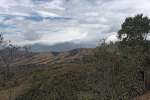“I am the Princess known around as the rebel,” Princess Barberena says as she looks at the sun fall over the Indian River in Greytown, Nicaragua. She likes to be called “Prins” rather than Princess, which she considers too dainty.
Greytown is a small colorful town where Black and Indigenous people govern. It lies at the crossroads of the Caribbean Sea, the Indio Maíz reserve and large, placid rivers in Nicaragua.
On any given day, children play on the street into the night while the rhythms of Jamaican dancehall music and Mexican cumbias blare. It is a peaceful place… or so it seems.
Ever since President Daniel Ortega’s riot police began bloodily repressing students who protested against the government in 2018 (killing more than 300 protestors), the Nicaraguan president has increased control throughout the Central American country and Greytown has been under more pressure, too. More soldiers flock to Greytown, more illegal settlers log trees in the reserve and, in turn, more challenges loom for Black and Indigenous peoples.

Prins, a 28-year old leader from the Nicaraguan Creole community (Kriols), defies oppression. Wherever she goes, raw energy follows.
“It feels like I’m a stone in their shoe,” she says referring to some local authorities who want her out because she wants to change the status quo. “They can’t stop mentioning my name. They’re scared of me when I should be the one scared of them, they are the ones who have the power.”

Everyone knows her in the small town of Greytown, also known as San Juan de Nicaragua. Authorities quash any form of protest, but Prins wears graphic T-shirts—with messages like “He who Abuses his Power Offends God” or “You Can’t Take Climate Activism Out of Me”—as a way to speak her mind.

As she scrolls down her endless stream of Whatsapp messages, Prins says “people think I do this for a paycheck, but really I’m not paid. I do this because I am committed.”
She jumps from Spanish to English or Creole to protect herself if she feels someone may be eavesdropping.
The people of Greytown are usually joyful and relaxed, but many now feel weighed down by the growing overarching power of President Ortega and his wife, Vice-President Rosario Murillo, who are slowly eating away at their autonomous rights. Prins specifically feels the weight of the authoritarian government, patriarchy and racism. So, she’s committed to doing something about it.

“My mom raised me with a purpose,” she continues.
After witnessing her mother defend Black and Indigenous rights in Nicaragua for years, Prins ran for secretary of the Kriol communal government of Greytown in 2019. She now reports, negotiates and carries out health, ecological and feminist projects for the community in the role.
In December 2018, Kriols from all over southern Nicaragua voted for Prins to become their regional president, but, according to Prins and others from Greytown, her nomination was blocked because she was a loud black woman.

From where Prins stands, anti-Blackness is well and alive in Nicaragua.
“Our lucha did not start on the 18th, like many say. Our lucha always existed,” she says, in reference to April 18, 2018—the onset of a series of protests that erupted in Managua that year.
“The fight for Indigenous and afro peoples existed since times of slavery,” she continues. “Our ancestors were used to fill the pockets of the rich.”
It is no secret that anti-Blackness pervades in Latin American communities and Nicaragua is no exception. Mestizo Nicaraguans from all social classes have “a history of discriminating against Black and Indigenous communities from the Atlantic coast,” political scientist Andres Pérez Baltodano tells Remezcla.
Prins is tired. Tired of the seemingly inoffensive racist jokes and tired of self-hatred in the Black Nicaraguan community, which she refers to as “mental slavery.”
“We need to mentally free ourselves from what is imposed on us every day,” she says, offering personal testimony to get her point across. Take, she says, for example the story of a friend who casually berates herself because of her blackness.
She would say things like, “I made a mistake. Por algo soy negra, [es] decir, bruta.”
That unfortunate perspective provokes a loss of Black identity, explains Prins.
The pervasive anti-Blackness also fuels family discussions about hair.
“My cousin would tell me ‘yeah, you’re Black but that doesn’t mean you have to wear your hair like this’,” Prins said, pointing to her now natural afro.
Under family pressure, she straightened her hair for years. “F*ck, how sad,” she says in Spanish as she looks back at old photographs.
When she decided to cut her hair in order to wear it naturally a few months ago, other women followed.
“I feel liberated. I feel like myself… yes, this is me,” she says with a glint in her eyes looking at a more recent flick.

Prins views the accelerated rate of deforestation of Indio Maíz—a UNESCO-recognized biosphere—by people who come to the area to illegally buy and sell land as a form of racism as well. In Bosawás (a neighboring reserve), eight Indigenous people were murdered by a group of illegal settlers last January and the relatives of a family in Greytown were massacred over land conflict a few months prior.
“They are taking what is not theirs, like ancestral lands,” she says. “And they’re not only taking them, they are destroying them. It hurts even more because they are destroying what has been handed down to [us].”
By law, the Kriol and Rama communities have full rights over their lands, but respect for their authority has dwindled. Some see the uncontrolled deforestation of their reserve as politically motivated by Ortega, who they believe tries to undermine their authority.
Indio Maiz lost at least 25% of its tree cover between 2001 and 2018. Organizations predict Nicaragua’s forests could be completely gone by 2028. So, Prins joined forces with local environmental group Batallón Civico Indio Maíz to attempt to save the reserve.
“What we defend is worth it. We believe it is the lung of Central America,” she says. Indio Maíz is part of five forests that capture 50% of Central America’s carbon.
“Without it, what would we become?” she utters.
Prins also organizes local feminist workshops so that women can open up and share personal stories on gender violence as well as ways to fight back. In Greytown, women of all backgrounds silently suffer from domestic abuse and teenage pregnancy. Prins enjoys “injecting feminism” in every political meeting she partakes in and believes it’s a challenge to be a woman, period. But, “if you’re afro-descendant, it’s another 100 burdens,” she asserts.
“A huevo, it has to change,” she says with a smile.

Prins wasn’t always this way. A few years ago, she went to a conference and saw mestizo youth speak up against the government’s canal project—which had been signed without Nicaraguans’ consent and would have cut through Nicaragua.
“It left a lasting mark on me,” she recalls. “I couldn’t ask a question because, in reality, I did not know what they were talking about. So I decided to absorb, absorb all I could.”
Research about the politics of Nicaragua came hand in hand with an internal awakening, which was propelled by the history class she took at the Bluefields Indian and Caribbean University, where she learned about the history of afro-Nicaraguans.
“I realized I existed for a reason,” she says, “and not only for the sake of existing.”
She believes that knowing oneself is the first step to freedom. She identifies as a “human and afro-descendant.” That kickstarted her fight for Indigenous and Kriol rights.
In March 2020, Prins took up an additional job at the regional Rama and Kriol government—which has been accused by local communities of siding with Ortega and Murillo. In other words, she now supervises the work of the same group she was blocked from two years prior.
“If I don’t, who will?” she asks.
Her mother, the person who most inspires her, tells her the same thing when she feels like giving up.
The work Prins puts in to change Nicaragua under Ortega’s strong grip, paired with patriarchal and racist pressure, can be mentally taxing and physically dangerous. Activists, and journalists who shed light on their work, are scrutinized and jailed regularly. Prins knows the risks and finds strength in her mother and community.
Despite the hurdles, she fights back. Prins now knows who she is and, through small actions, she encourages her community to recover their identity and reclaim their land and bodies as well whilst losing the fear of speaking truth to power.
The good news is she’s committed to doing so for the foreseeable future.
“Next time you come,” she tells Remezcla, “you’ll see us more empowered.”




